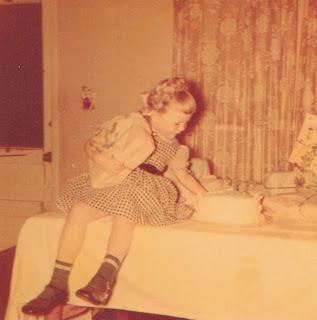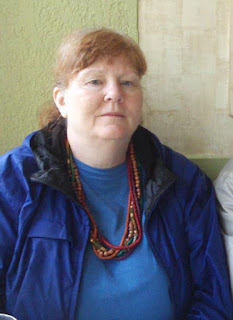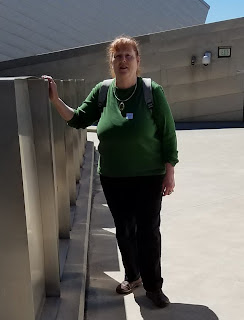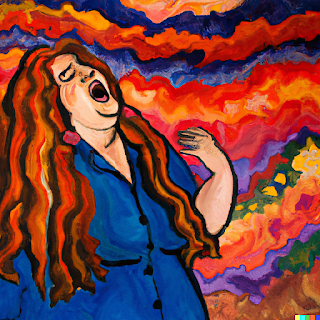Autumn: The “Why” and Conversations with My CPAP
 |
| The Author's CPAP mask as an artifact ________________________________ |
Without
my “Why,” I would probably gain my weight back.
My
Why had better remain strong and at the forefront of my mind – yes, a healthy
obsession – otherwise, I will gain
the weight back.
Indeed,
as I have said in previous chapters, there is no guarantee that I will keep the weight off, despite my Why – it
is no accident that I refer to myself as a fat woman walking.
I
need a constant reminder of why I
have undertaken this difficult journey and why I continue on its path, even
though it remains tricky – in some ways more treacherous than those heady
weekly weight losses.
Frankly,
it’s not all that exciting to see, every day, the same number register on the
scale, except to note that it represents a normal
weight.
Even
in paradise, days normalize and become ordinary with the same-old, same-old
daily slog.
I
remember well when my Why was born, a date that will remain forever etched in
memory:
May
5, 2016 –
The
day I picked up my new CPAP from the medical supply company.
For
most people my age, this intrusive piece of equipment would represent a minor
bump in a life that has been generally robust and healthy. After all, this
machine would manage my newly-diagnosed sleep apnea by helping me sleep better
and, more importantly, help me breathe at night.
Not
me – I was thoroughly pissed off – affronted at the device that had the
audacity to muscle its way into my bedroom:
How DARE you intrude in
my life!
But
what choice did I have? Untreated sleep apnea can kill – and does.
Often,
the first diagnosis of this condition is at autopsy, after someone has died in
his or her sleep – in that regard, I was fortunate. My case was mild to
moderate and diagnosed after my complaint of not sleeping well.
Specifically,
I was diagnosed with Obstructive Sleep Apnea (OSA), caused by “a
blockage of the airway, usually when the soft tissue in the back of the throat
collapses during sleep.”
According
to WedMD, sleep apnea is a “serious sleep disorder
that occurs when a person’s breathing is interrupted during sleep. People with
untreated sleep apnea stop breathing repeatedly during their sleep, sometimes
hundreds of times. This means the brain – and the rest of the body – may not
get enough oxygen.”
Yikes!
While
there are many causes for this disorder, excess weight seems to be a major
commonality – according to the NIH,
50% of sufferers are overweight or obese. Also, patients with large tonsils
and/or small airways are prone to obstructive sleep apnea.
Evidently,
the cause isn’t the overall excess weight, per se, but when the body picks up
pounds, the flesh in the neck also expands, hence the soft tissue collapse.
In
other words, a largely avoidable disorder.
I
was thoroughly disgusted that I had allowed myself to arrive at this point.
Moreover,
I viewed my new CPAP as an unwanted tenant in my house and on my nightstand,
which meant I would have to move my books and magazines to make room for “that
thing.” (I later bought a magazine rack from the Goodwill.)
I
got mad, but mad without a plan.
After
I set the CPAP up, I fumed and stomped around the house in a fury.
How could this happen to
ME?
Then
the voice: “You know what you have to do.”
My
fat body was speaking to me.
It
was then that we had a serious conversation, which is posted here.
Once
I had made the decision to return to Weight Watchers, it was time to face my
Why head on:
ME: (To the CPAP, all set up): Hey, you!
CPAP: You called?
ME: I hate you.
CPAP: Who, me?
ME: Do you see
anyone else here?
CPAP: No, but –
ME: Don’t get too
comfortable.
CPAP: Hey, don’t
get mad at me. I’m just the messenger.
ME: You’re an
intruder.
CPAP: (Settling in) Heh.
ME: Expect to be
evicted, sooner rather than later.
CPAP: Not likely.
We CPAP’ers tend to enjoy a long tenure in our new digs. (Pause.) I think I’m going to like my new home, although it’s a bit
messy here.
ME: Everyone’s a
critic.
CPAP: You know,
you’ll have to keep me clean…
ME: Yes, I was
told that.
CPAP (Looking around.) It’s kinda dusty in
here.
ME: Your point?
CPAP: You can get
sick from a dirty CPAP mask. Dry throat. Post-nasal drip. Bronchitis. Pneumonia.
Death.
ME: I’ll be
washing – IT – every day.
CPAP: You’d
better.
ME: You’d better
do your job and shut the fuck up about it. My husband needs his sleep and no
drama about it from you.
CPAP: I’ll be a
very quiet resident –
ME: You mean
“unwanted guest.”
CPAP: (Chortles.) It’s quite cozy here.
ME: You’re already
a romance killer…
CPAP: You lack
imagination…
ME: (Exasperated.) Now, look here –
CPAP: (Sighs and raises its tubing.) We could
go around and around on my resident status, but could we call a temporary truce
on deportation?
I
agreed.
So
we raised the white flags and retreated to our corners.
I
promised to keep the machine and its parts clean, and it assured me it would
work as agreed.
Meanwhile,
I quietly plotted: I would work toward losing weight, although there would be
no guarantees of an eventual cure.
For
the next 11 months, I struggled with the CPAP. For one, I had to keep the mask
scrupulously clean, which meant a daily scrubbing with hand soap. I had to do
this each morning upon arising; otherwise, I would forget – out of sight, out
of mind.
Once,
I got the bright idea of using baby wipes for this chore. I thought it would be
more sanitary and easier.
HA!
What
I hadn’t considered: wipes contain tiny little fibers – okay for baby bottoms,
but not so good for a closed environment that would be delivering air to my lungs.
Fortunately, we all have little hairs in our noses to stop such dangerous
substances from entering our airways, but, unfortunately, tiny fibers tickle
those hairs. For three nights, I couldn’t figure out why I was sneezing all
night.
Then,
on the third day, I saw hundreds of those fibers all over my mask, inside and
out.
Well,
duh.
Back
to soap and water.
Other
little indignities: The water chamber requires distilled water – I suppose to
mitigate mineral buildup in the equipment – and regular cleaning. In addition, a
filter needs to be replaced every few weeks – I’m famously disorganized when it
comes to medical issues, forgetting to take medicine and, now, changing the
filter.
In
the early days, the mask dried my mouth out, particularly in winter or other
low humidity weather; I would often wake up in the middle of the night without any saliva, which causes a sense of
choking. Also, if the mask isn’t adjusted correctly, I wake up to a loud and
annoying raspberry noise (THBBPTHBPT!!!). And as I continued losing weight,
adjusting the mask was a daily battle.
Believe
it or not, heads and faces, regularly lose and gain weight – not much, but
enough to wreak havoc with a device that seems cranky and capricious when it
comes to mask sizing.
And
then there’s “CPAP face,” deep indents left by a mask that must fit tightly –
as if I need more wrinkles…
Hair.
I learned early on to braid my long hair before retiring at night. Otherwise, I
would awaken with a rat-tail tangle.
If
I made the mistake of eating onions or some other delicious but pungent food
too late in the day, I got to smell my own hideous breath all night, even after
scrubbing my teeth and gargling with mouthwash.
Sweet.
Travel.
OY!!!
Manufacturers
of CPAP devices tout the portability of these devices, but don’t believe it.
CPAP + water chamber + electrical cord + hose + mask = carryon hog (Snort!).
And while TSA is supposed to recognize medical devices and treat them gingerly,
well, that doesn’t stop them from giving you a hard time and mishandling your
possessions.
One
group of TSA brainiacs in Savannah, Georgia, manhandled my water chamber and
cracked it. No accountability, and not covered under the warranty either.
I
lucked out; the medical supply company gave me another chamber, returned by a
patient who no longer needed it (Now dead???)
Oh,
and then there’s the distilled water conundrum. When you fly into a strange
city, you must hunt for a store that carries it – I remember, not too fondly,
one 1:00 a.m. foray into Wal-Mart in search of the precious liquid, only to
find that local drug users or dealers had cleaned out the inventory.
Evidently
distilled water is used for dissolving illicit drugs for injection.
Who
knew?
Occasionally,
hotels have some on hand, sometimes not. You can’t carry on distilled water on
airplanes (because terrorists), and packing it in your luggage is bulky, heavy,
and risky.
Then
there is the electrical outlet issue in a hotel room – where to plug in the
damn thing? I have had to come up with some interesting acrobatic solutions,
such as using an ottoman for the CPAP’s temporary home and being attached to a
short tube.
Okay.
It could be worse – at least I’m not toting around oxygen tanks, day and night.
Always
an upside.
Fast
forward to April 2017. During my yearly appointment at the Pulmonary Clinic, I
was hoping for some good news.
I
was very close to my goal weight – I felt entitled to be rewarded for all my
hard work.
Alas,
I was told that while my cmH2O pressure had dropped from 11 to about 7-9, it was not indicated that I could go off the CPAP just yet. Instead, it would be reset to a dynamic setting, starting at 6 cmH2O and varying throughout the night as needed, up to 14, and my condition would be reassessed in August.
Then
in August, during my follow-up appointment, I was hoping against hope.
In
the interim, I had lost a few more pounds; I had been at goal weight for about
four months, and my body was adjusting and firming up.
But, again, bad news. My stats were still showing some breathing
abnormalities – some isolated incidents at 9 cmH2O, albeit
mostly at 6 or 7 cmH2O, which could be considered a normal
breathing pattern.
According
to the Pulmonary Specialist, I wasn’t quite there yet.
I
was disappointed, but I had heard about an option that I wanted to explore: Inspire, which involves implanting a device that would eliminate the need for the
CPAP by stimulating key airway muscles and keeping them open during sleep.
The
Specialist seemed to think that this could be a good option, although I didn’t
quite fit the criteria: I no longer had moderate OSA – now upgraded to “mild” –
and I hadn’t been “non-compliant” in my CPAP use.
Constant
kvetching didn’t count.
Who
knew that non-compliant petulance could be rewarding?
Silly
me, we live in the age of Trump…
I
did fit one criterion: my weight is normal. In fact, slight overweight also
fits the criteria.
After
I begged, the Specialist referred me to an ENT who specializes in the Inspire
program.
Long
story short, the doctor looked at me and then my chart. He said, “Hmmm, I don’t
think you have sleep apnea anymore.” In a jocular manner, he explained that
this $20,000 device is covered by Medicare and that he could make a nice profit
prescribing this therapy, but he didn’t think it would serve my needs.
“Let’s
make sure by sending you back to the sleep lab.”
I
wanted to hug him.
“I’ll
prescribe a possible split session, but I suspect you’ll not need it.”
In
a split session, the patient is first assessed without CPAP therapy. If the
patient’s stats are abnormal, the patient is then hooked up to the CPAP for the
second half of the test – if they are at least near normal, the rest of the
night will proceed without the CPAP.
I
passed my study, finishing it without the CPAP!
Indeed,
I was diagnosed as having a nearly normal night, although my sleep “architecture”
was poor, the test itself “suboptimal” (in other words, I did not sleep well –
not surprising, given that (1) I am a natural night owl forced to tuck in
early, and (2) I was hooked up to numerous wires). Still, based on my sleep
study, the findings were “consistent with no significant obstructive sleep
apnea.” My apnea-hypopnea was fewer than 3.9 apnea events per hour – fewer than five is considered normal – thus no longer qualifying for the CPAP.
Yay!
Now
it was time to start eviction proceedings against my nemesis; besides, Medicare
would no longer cover the “rent” for my CPAP, so I would need to return it to
the medical supply company.
I
didn’t have a problem with this.
ME: (To the CPAP.) CHOP! CHOP! Time to pack
up! You knew this day would be coming!
CPAP: You don’t
have to rub it in…
ME: Nothing
personal. You take up too much valuable real estate, physically and
psychologically.
CPAP: (Choking.) I was just settling in…
ME: The Company
will refurbish and clean you and send you to a more loving home.
CPAP: (Whining.) If I were a service dog, you
wouldn’t evict me.
ME: I like dogs. I don’t like you. Besides, you’re a machine, devoid of any
discernable personality. My car has more personality than you, and it doesn’t
have much.
CPAP: That’s harsh.
ME: That’s the
truth.
CPAP: I didn’t
think you’d really do this – I thought you’d lose interest in walking and
staying on plan and become used to me. You weren’t so bad as a fat person.
ME: While I had
issues with being fat, I had accepted it
and swore I would never diet again. You were the tipping point.
CPAP: (Petulant.) So you should thank me, not demonize me.
ME: (Pausing.) I’ll give you that.
CPAP: I gave you
many nights of good sleep. I helped moderate your monstrous appetite into a
dull roar, a positive side effect of decent sleep. I kept your airway open so
you could breathe better. All in all, I’m a very sophisticated machine who did
its job as agreed. I’m sorry I couldn’t entertain you, like Mr. Kindle. Where
was Mr. Kindle when you woke up in the middle of the night, choking and trying
to catch your breath?
ME: Good point.
But my Kindle was designed to make me happy, not to plaster itself all over my
face and cause sore throats and dry mouth, not to mention more wrinkles.
CPAP: Sorry I
haven’t been perfect.
ME: (Softening.) Well, I can’t blame you for
all my ills. You didn’t make me fat or give me sleep apnea – I did all that all
by myself.
CPAP: We did have some good times together…
ME: Spare me the
fake nostalgia…
CPAP: (Softly.) I may have looked like plain
vanilla, I know I took up precious space in your life, and I was a nightmare
traveler, but I enjoyed helping you.
ME: (Tearing up and choking.) You did help me.
CPAP: Thank you.
ME: No. Thank you!
CPAP: Change is
hard.
ME: Yes, I know.
This past year has been hard.
CPAP: I’m sorry.
ME: Don’t
apologize. You were just doing your job.
CPAP: I did my
best.
ME: And you did it
well. (Pausing.) Look, I suspect that
your next assignment will be more permanent. Most fat sleep apnea sufferers don’t
lose weight, at least not enough to shuck CPAP therapy.
CPAP: I’ll never
forget you.
ME: Yes, you will.
You will be reset and reissued. I bet you don’t remember your last user.
CPAP: Maybe you’re
the first…
ME: But you don’t
know.
CPAP: No. I’m just
a machine.
ME: Now I’m going
to pull my data card to keep and send you; the water chamber; unopened masks,
tubing, and filters; and the modem back to The Company.
CPAP: Okay.
ME: You probably
won’t remember me.
CPAP: Please just
unplug me and pack me up. I’m ready to go now.
ME: Okay.
Now
that the parting of ways was real, I
was feeling a bit choked up; the year that I was using the CPAP turned out to
be a game changer. I am convinced that getting enough sleep and breathing
consistently has changed my physiology in major and positive ways.
For
example,
I
no longer go to bed at 5:00 a.m. and sleep past noon; I am in bed by 2:00 a.m.
(or earlier), and I arise at 8:30 or 9:00, not kicking and screaming. Upon
awakening, I am no longer groggy and cranky; I jump out of bed, ready to go.
I
no longer need to tame a voracious and often uncontrollable appetite (unless I
don’t eat when I should); my appetite, while still requiring “volume,” is more
manageable, my appestat working like it should, and that is huge.
I
am no longer clinically depressed. Sure, I still have down days, but they feel
“normal.”
An
unexpected benefit: I no longer feel groggy and out of sorts. My thinking is
clearer, and my intellect sharper. Before the CPAP, I felt as though my
intellectual abilities were slipping – I felt foggy and depressed.
All
these changes have happened – in large part – because of the CPAP therapy.
But
for me, it represented the demarcation between good health and the slide toward
physical decline.
As
a reminder, I have hung my old CPAP mask on the bookcase, next to my side of
the bed.
In
late October I went to the medical supply company to return the CPAP.
It
turns out that the device was a rent-to-own deal, my last payment made in
August.
“You
own it,” the representative, with a
wide smile, said – as if this were a good
thing.
Sighing,
I dragged the thing home.
As
I stashed it in the attic:
CPAP (Snickering.): Heh, heh. I’ll be waiting
for you…
ME: (Petulant.) I’m not going to screw this
up.
CPAP: We’ll see.
Yes,
we’ll see.
 |
| The Author posing in her CPAP regalia. She hopes this will be the last time she has to wear it. _______________________ |








Comments